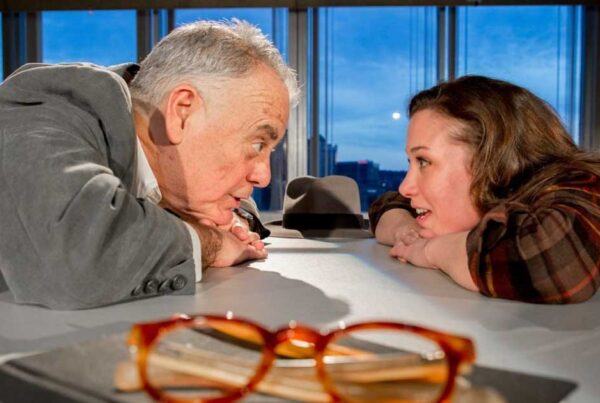
Coal Hill Review – A little known fact in the Pittsburgh dance community is that Michele de la Reza, co-director of Attack Theatre, performed mime as her first stage experience. She eventually went on to receive a degree in dance from the renowned Juilliard School, but her original training never left her.
Her partner, Peter Kope, also has dramatic experience. At age eight, his first role was as an actor. Together, Kope and de la Reza are entering into their 21st season of choreographing contemporary dance. But they have also spent their careers creating movement for close to twenty different operas.
Their latest collaboration, with Quantum Theatre and Chatham Baroque, was unique in that the show included all four Attack members: Kaitlin Dann, Dane Toney, Anthony Williams, and Ashley Williams. The dancers made up a large part of the production. Most impressive was their ability to change characters throughout the two and a half hour show. At times, they provided background, abstracting emotions or landscape. In other scenes, they took on literal roles.
The Winter’s Tale was written by Shakespeare in his late career, and provides both humor and tragedy in its ultimate story of love. Quantum’s artistic director, Karla Boos, collaborated with Andres Cladera and Chatham Baroque to transform the play into what is known as a “pasticcio.” The term refers to a style of opera that uses different composers to adapt an existing work. Included were musical works by Bach, Purcell, Handel, Vivaldi, and others.
The story moved from dark to hopeful. King Leontes imprisoned his pregnant wife, Hermione, whom he accused of infidelity with his best friend, Polixenes. When Hermione ultimately died, Leontes fell apart, filled with regret and sorrow. Only after sixteen years did the family find peace and happiness.
In addition to the remarkable singing and acting, the dancing showed exquisite range. Modern dancers are often trained to tone down their facial expressions and emote with their bodies. On the other hand, stage acting calls for a wide breadth when it comes to use of the face. The dancers slipped in and out of this easily, depending on the scene. De la Reza and Kope coached them on finding authenticity within the exaggeration.
There were many standout moments in terms of the movement. In one scene, Leontes ordered Antigonus, his steward, to abandon his newborn baby. Antigonus obliged, taking the infant to a forest. While video projection showed the sinister image of vines intertwining and rising up, the dancers wove their own limbs in and around each other. Their movement brought life to the forest.
Another rich phrase came when the dancers turned difficult partnering into a fight scene. The movement reflected the anger of Leontes, and added a layer of emotion to the production.
The dancers were skilled with their humor as well. To signify the famous (or perhaps infamous) Shakespeare scene when Antigonus is eaten by a bear, all four of them staged their own deaths. They convulsed on the floor in jest until their bodies contracted and then flopped dramatically into stillness.
It’s always a challenge for an adult to play the part of a child. Dann took on the role of Mamilius, the king’s son whose death is brought on by grief. She and the other three dancers brought out their inner children without mimicry. The movement was wisely choreographed as light and playful.
Sometimes the choreography simply matched the mood. In a bleak moment, the dancers paired off in the two balconies and performed slow partnering phrases under low light. Near the end, the dancers used the entirety of the stage in big, technical movement that matched the period well, although not literally. De la Reza and Kope chose balletic movement, regal in nature and reminiscent of a stately court processional.
The show succeeded in many ways. The caliber of each artistic genre was unmatched. Quantum Theatre and Chatham Baroque continue into their 25th anniversary seasons with quality and creative performances. And Attack Theatre proved, once again, their flair for the dramatic and a mastery in choreographing and performing opera…




